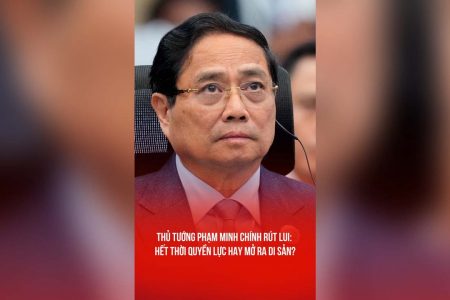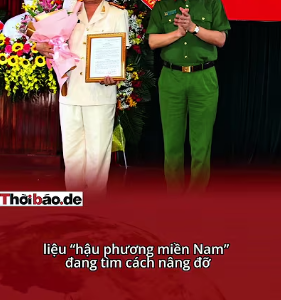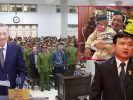
On December 1, in Dubai, Prime Minister Pham Minh Chinh, on behalf of the Government of Vietnam, announced a plan to mobilize resources, implement the Political Declaration, and establish an energy transition partnership with the Group of international partners. This is to achieve the goal of mobilizing $15.5 billion in funding, which the G7 industrialized countries committed to Vietnam from the end of 2022.
Previously, on November 21, the Forum of Vietnamese Administrators – The Leader – analyzed, „Why did Orsted stop developing wind power in Vietnam?“ Accordingly, the world’s leading renewable energy group Orsted has decided to stop all offshore wind power investment plans in Vietnam.
It is known that Orsted decided to „quit the game“ of developing wind power in Vietnam, because the Vietnamese State does not have a clear and unified policy, so investors have not boldly poured billions of dollars into projects. At the same time, Orsted Group also said that key policies related to deploying and purchasing electricity from their offshore wind power project are delayed and unclear.
This happened right after the US Intel Corporation, the 3rd largest chip manufacturing specialist in the world, which has invested $1.5 billion in Vietnam since 2006, also decided not to implement its expansion plan of $1 billion to expand production in Vietnam.
The reason Intel stopped expanding its investment in Vietnam is that the power supply is inadequate and unstable, and the administrative procedures are cumbersome, complicated, and stagnant in the government administration. Instead, Intel invested $4.6 billion to build a new chip factory in Poland!
Power shortages, during the heat wave in May and June 2023, led to the Vietnam Electricity Group (EVN) having to conduct rotating power cuts, causing production interruptions, as well as negative impacts on people’s lives and activities.
While 4,600 MW of excess wind and solar power cannot be transmitted to the national grid, EVN still imports electricity from China and Laos. Through research, it is known that the cause of this situation is a problem of „procedures and regulations of EVN and the Ministry of Industry and Trade.“ But, what is worth mentioning is that the procedures are set by themselves, why does the Ministry of Industry and Trade not improve and amend these procedures to connect to the grid for wind and solar power?
Former General Secretary Nong Duc Manh, in April 2006, affirmed that by 2020 Vietnam will basically become a modern industrial country. Yet, up to now, electricity supply is not enough for production and life, due to the weak executive and management capacity of ministerial-level leaders, making Vietnam’s industrialization plan becomes unmaterialized.
According to experts, the result of foreign investors withdrawing from Vietnam is due to the poor management capacity of leading officials of EVN and the Ministry of Industry and Trade, especially Minister Nguyen Hong Dien. Accordingly, Minister Dien was confused in operating and directing the supply of gasoline, causing local gasoline shortages in many localities across the country.
General Secretary Nguyen Phu Trong – Head of the Human Resources Subcommittee of the 12th and 13th Congresses – must be responsible for this issue. In his role as Head of the Human Resources Subcommittee, is General Secretary Nguyen Phu Trong aware of the role of the Minister of Industry and Trade – the person responsible for managing production and business activities of the entire country’s economy?
Why, for what reason, did the General Secretary choose Mr. Nguyen Hong Dien, a person who came from a commune cadre, rose to the position of Secretary of the Thai Binh Provincial Party Committee, then Deputy of the Central Commission for Propaganda and Education, a person who has no economic management expertise or executive capacity as the minister of trade and industry?
Experts say that based on money and connections, Nguyen Hong Dien was able to sit in the position of Minister of Industry and Trade. This is the merit of Dien’s father-in-law, Tran Van Sen, Chairman of the Board of Directors and General Director of the multi-industry Huong Sen Group, famous for its Dai Viet beer brand. Sen is a tycoon, a tycoon known to kings and known to lords, in Thai Binh land.
According to journalist Pham Vu Hiep, in the article „The story of the new Minister of Industry and Trade and the owner of Dai Viet Brewery“ he revealed:
“Tran Van Sen, with his wide and close relationship with the Standing Committee of the Secretariat Tran Quoc Vuong, and previous leaders of Thai Binh province, such as Nguyen Hanh Phuc, Tran Cam Tu… has caused a stir in Vietnam’s politics when he brought his son-in-law Nguyen Hong Dien, a cadre trained in propaganda, a bachelor’s degree in history and an „in-service“ degree in accounting, to arrogantly sit in the position of Minister of Industry and Trade, a super ministry.”
It is known that on December 8, 2017, in a meeting of the Politburo, Nguyen Phu Trong asked a critical question: „Why do people say: Relationships, money, descendants, and wisdom is the last. With relationshop, officials create their fractions, and speak very well, and get promotions?”
Public opinion has asked the question, are the recent Ministers of Industry and Trade, such as Tran Tuan Anh and Nguyen Hong Dien, were promoted by using money during the time of General Secretary Nguyen Phu Trong?
Thoibao.de (Translated)


























